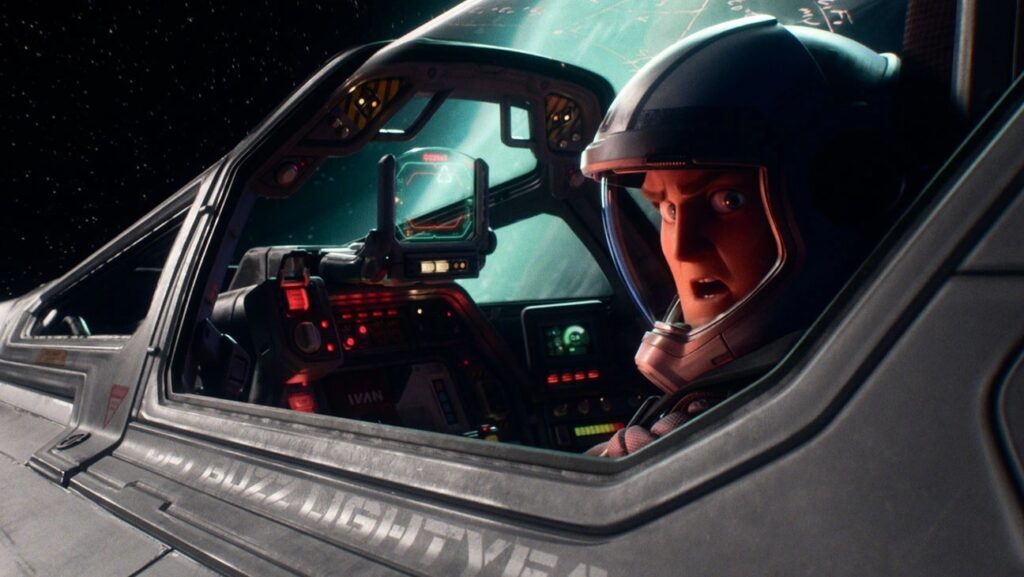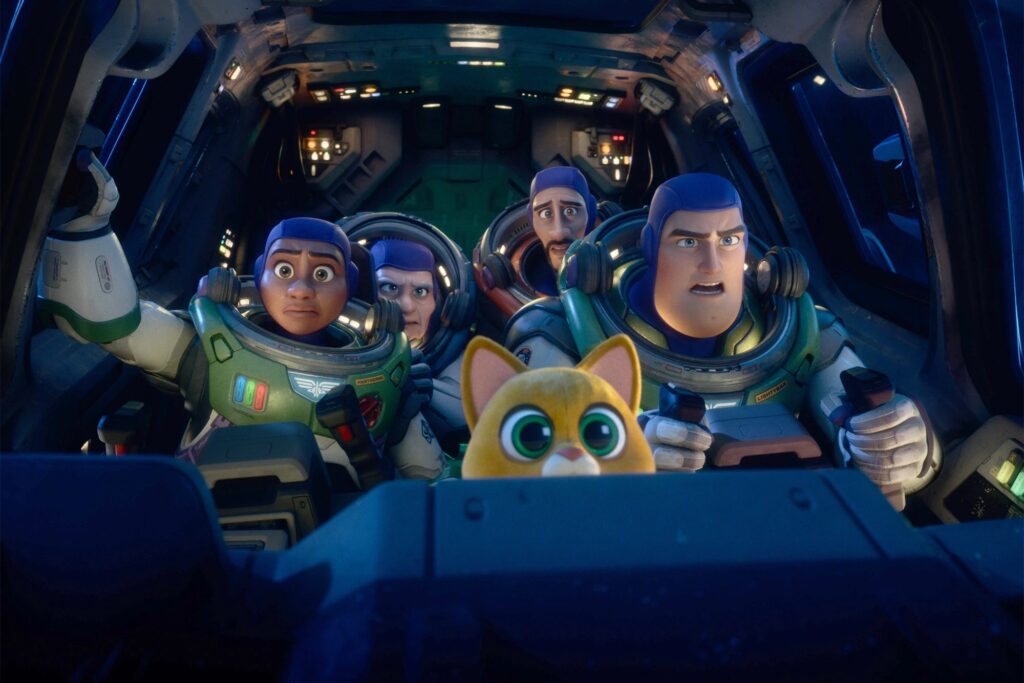Before he was a toy, he was the star of Andy’s favourite movie… that’s the premise of Lightyear, Pixar’s Toy Story spin-off focusing on the titular space ranger being put through his paces on a strange new world. It is a standalone adventure that takes the studio back to the stratospheric heights of WALL-E, having based recent stories closer to home in the likes of Luca and Encanto. But bigger doesn’t mean better, and despite the typically lavish animation and some entertaining side characters, Lightyear feels a little soulless.
After crashing his 1200-strong crew onto a strange uncharted planet, Buzz Lightyear (Chris Evans, replacing long-time Buzz voice actor Tim Allen) is determined to forge new hyperspeed crystals that will help him and his friends get home. But the task proves almost impossible, and Buzz is forced to contend with his own wretched record of failure in the face of duty. In despair, he turns to an unlikely team of allies – space cadets Izzy (Keke Palmer), Mo (Taika Waititi), and Darby (Dale Soules), as well as robo-feline Sox (Peter Sohn) – when the evil Emperor Zurg (James Brolin) decides to pay Buzz a visit.

The writing may have been on the wall from the beginning. As great a character as Buzz is, he was never the heart and soul of the Toy Story franchise, and Lightyear can’t offer anything to the contrary. The movie’s central messages of learning from mistakes, living life to the full and accepting the help of others are the kind of kindling Pixar typically uses to light an emotional fire beneath their films, but with a bizarrely stoic lead like Buzz, it feels lost. Put simply, the film never gives you a reason to care about what happens to its titular character.
While Toy Story’s Buzz is angular, playful and most obviously a toy, human Buzz looks disturbingly hyperreal compared to the rest of the characters (who retain Pixar’s typical inventive expressiveness). Evans’ performance meanwhile, seemingly on the fence about whether to bring a new slant to Buzz or not, ultimately feels like a hollow mimicry of Allen’s defining work, complete with rehashed old character quotes and predictable recurring jokes. This strange presentation is exacerbated by the supporting cast, who trigger more of a heartfelt reaction than the space ranger ever could. Palmer in particular brings some light-hearted soul and quiet grit to a character who will undoubtedly prove to be a source of inspiration for swathes of younger viewers. Waititi is predictably balmy and brilliant with a relatively small role, while Sohn almost steals the show with his turn as the playful mecha-cat Sox. The supporting cast end up ticking far more boxes than Buzz himself.

Weak-ish characters can be saved by a belting story, and with Turning Red Pixar proved that there is plenty of imagination left in that department. But compared to Domee Shi’s feature debut, which feels increasingly revolutionary with each passing week, Lightyear’s story is frustratingly by-the-numbers. It is more or less a case of Buzz and co traversing some kind of obstacle, learning some kind of lesson, and then repeating. Director Angus MacLane is too interested in propelling the film forward with speed, confusing pace for content and not doing Buzz any favours by cutting short what should be his most profound scenes. Zurg meanwhile makes one hell of an entrance but then his big reveal, though initially shocking, makes little sense with hindsight (not to mention how it completely discards Buzz and Zurg’s relationship from Toy Story 2). Zurg’s entire involvement in the story, beyond clinging desperately to some kind of Toy Story tie-in, is questionable. The studio’s return to thrilling adventures as opposed to touching coming-of-age stories has not gone to plan, and narratively Lightyear is easily one of Pixar’s weakest films.
For a film set 4.2 billion light years away, Lightyear never even gets off the ground, leaving you wondering just what the point of all this really is. The animation is, of course, stunning – sunsets, hyperspeed and futuristic urban landscapes are captured with arresting beauty – but sadly this beauty is only skin deep. MacLane’s film feels confused about its place in the world, and (much like Buzz himself) is desperate to somehow matter, without stopping to think carefully about how to go about this. A weak, poorly thought-out story and lack of heart make the film feel like an unwelcome intrusion on Toy Story’s legacy and, by extension, Pixar’s. You can’t quite say the studio is in crisis (too many of their recent films have been exceptional for talk like that), but Lightyear is unmistakably a misfire of galactic proportions.
Lightyear is out in cinemas now.
